

Have you ever scrolled through endless product listings online, full of conflicting information and missing details, only to leave the website and go on to a different one?
Frustrating, right? This is the reality for many shoppers today, and it’s expensive for e-commerce businesses.
In today’s fierce e-commerce battleground, where customers expect clear and consistent information at their fingertips, product information management (PIM) is no longer optional. It’s essential.
Think of it as your battle-tested weapon against inconsistent messaging, low product data quality, and missed sales opportunities.
This blog will uncover the pitfalls of ignoring PIM and explain how PIM software can streamline workflow and increase productivity. We’ll also showcase the top 10 PIM systems for 2024.
Don’t miss the secret to flawless product management and customer satisfaction.
What is PIM software?
Product Information Management or PIM software centralizes and manages product data and digital assets in a unified platform. PIM software simplifies product data management across multiple sales channels, integrating with eCommerce platforms, CRM systems, and ERP software. This ensures that your product-related communication is up-to-date and accessible throughout your customer base.
This platform manages data necessary for marketing and selling products, benefiting brands, manufacturers, distributors, and retailers by providing a single source of truth.
For businesses, the PIM system collects, enriches, and updates data to its destination, improving data quality, operational efficiency, time-to-market, customer experience, and accessibility across channels and digital points of sale.
What Should You Look for in Product Information Management Software?
There are plenty of PIM software available in the market. However, each has its own differentiator and its advantages and disadvantages. However, the PIM you choose should include a few of these key features:
- Data import and export: Simplify data management with software that offers easy data import and export from various sources and formats
- Integrations: Choose software that integrates with your existing business systems like e-commerce platforms, ERP systems, and CRM systems
- Intuitive interface: PIM software is typically used across teams and departments. Prioritize interfaces that are user-friendly and easy to navigate, even for non-technical users
- Scalability: Ensure the software can accommodate your growing product catalog and user base
- Reporting & analytics: Choose a PIM system that offers reporting tools to track key metrics and gain insights into product performance
- Digital asset management (DAM): Consider using software with built-in DAM capabilities to manage your product images, videos, and other rich media content
- Channel management: Choose software that manages product listings and content for various sales and marketing channels
- Collaboration tools: Choose a PIM platform that offers collaboration features to facilitate communication and data sharing between teams
The Top 10 Best Product Information Management Software to Use in 2024
Now that you know what to look for in your ideal PIM software, here’s our list of top 10 alternatives to help you increase sales, sell products faster, effectively write product content, and amplify customer experience.
1. Pimcore
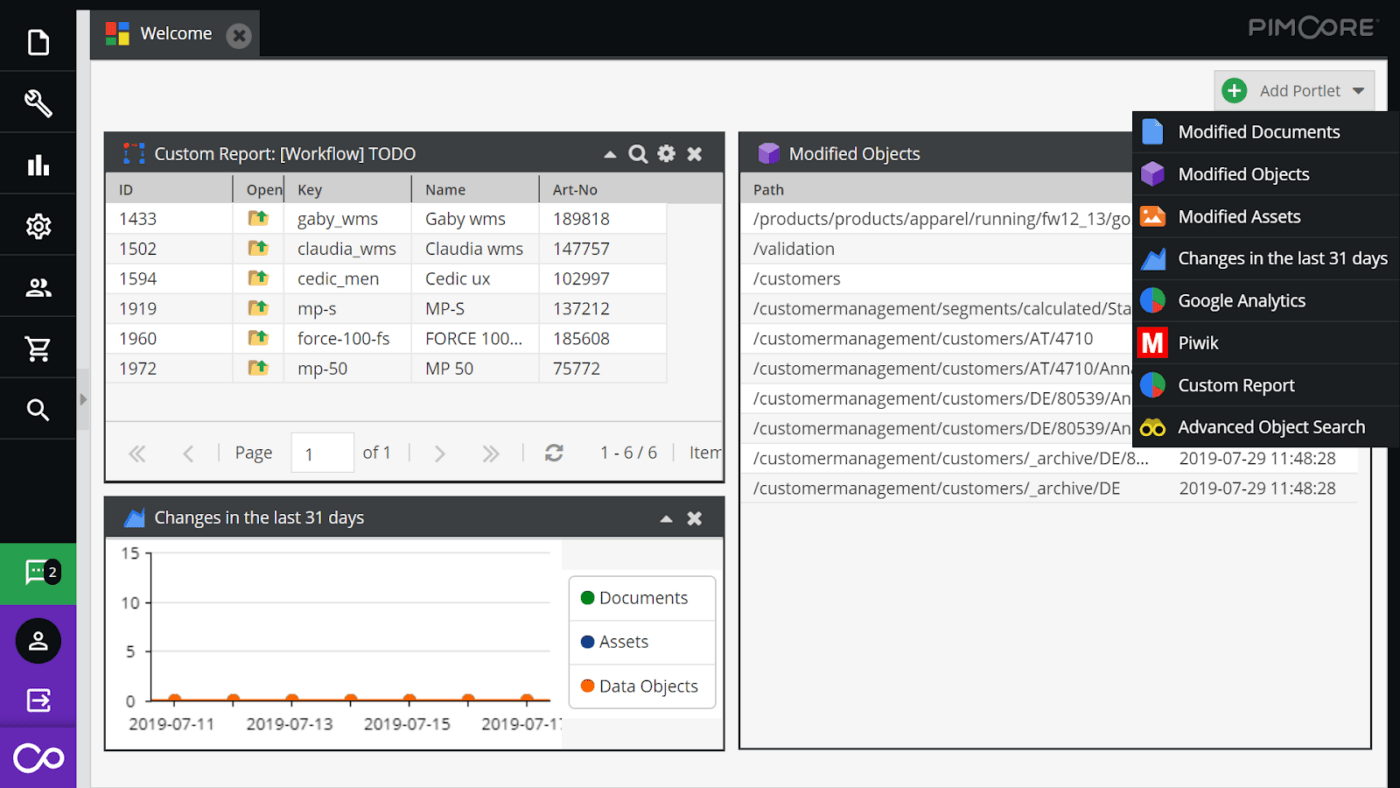
Want a platform to manage your product pipeline end-to-end? The Pimcore platform provides software that manages product information, digital assets, digital experience, master data, digital commerce, and customer data.
Think of it as a digital command center where you can manage product information and run your online store.
This centralized approach helps businesses eliminate data silos, manage product data, ensure consistency across channels, and ultimately deliver smooth and personalized experiences for their customers.
Pimcore best features
- Create sophisticated, marketing-driven, personalized websites and portals
- Manage digital data and customer-centric experiences for all digital channels
- Use open source customer support system set up and customize the platform
- Easily create and manage website content, landing pages, and blog posts
- Build and manage your online store with features like product listings, shopping carts, and payment processing
Pimcore limitations
- The feature-rich platform can lead to a steeper learning curve, especially for new users
- Some users have reported performance issues with complex setups
Pimcore pricing
- Community Edition: Free
- Enterprise Edition: Custom pricing
- Cloud Edition: Custom pricing
Pimcore ratings and reviews
- G2: 4.5/5 (40+ reviews)
- Capterra: 4.8/5 (20+ reviews)
2. Pimberly
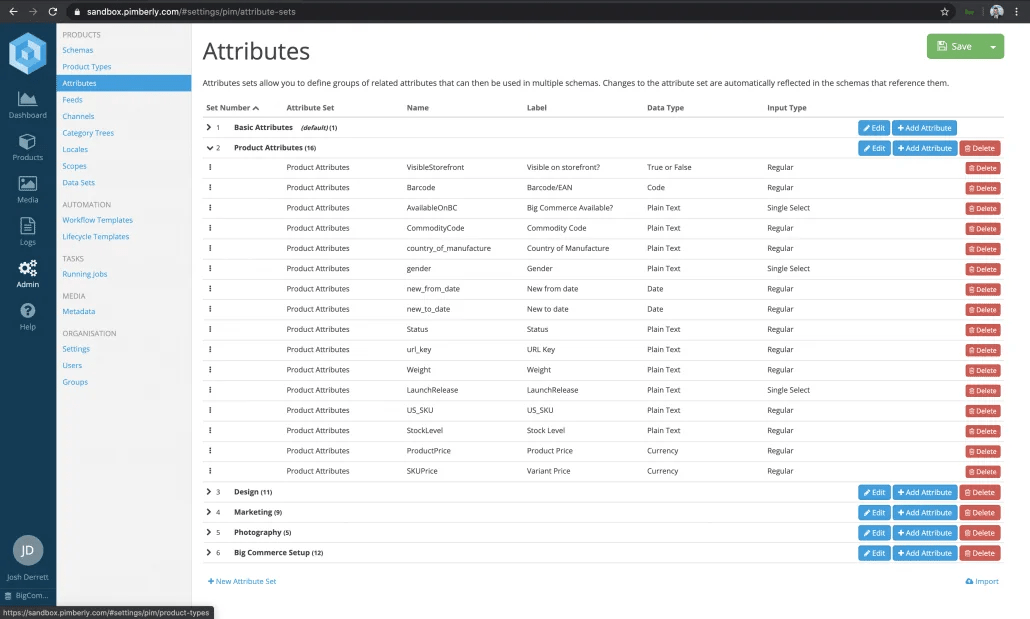
Pimberly provides PIM software that helps manufacturers, brands, distributors, and retailers manage and optimize product data across various channels.
With built-in AI functionality, this PIM platform enhances product data processing capabilities, learns from data patterns, automates complex processes based on learnings, and provides strategy guidance on product structure and how customers can meet their target audiences’ evolving needs.
Pimberly best features
- Store and organize all product knowledge, including product descriptions, specifications, images, videos, and marketing materials, in a single location
- Automate and optimize product data with translations, SEO keywords, and rich media content for various sales channels
- Ensure product data meets the specific requirements of e-commerce platforms and B2B portals
- Provide accurate and complete product information to customers during the purchase
- Gain valuable insights into product performance through reporting and analytics features
- Connect with other business systems like CRMs and e-commerce platforms for smooth data exchange and automation
Pimberly limitations
- Users may experience less flexibility for specific workflows and data needs
- Performance challenges may arise with complex setups or massive data volumes
- Less comprehensive reporting and analytics features compared to other PIM solutions
Pimberly pricing
- Regular: $30,000/year
- Pro: $60,000/year
- Corporate: $90,000/year
- Enterprise: Custom pricing
Pimberly ratings and reviews
- G2: 4.4/5 (50+ reviews)
- Capterra: 4.4/5 (15+ reviews)
3. Semarchy

Looking for a PIM solution that focuses heavily on data management and data-driven insights? Semarchy is what you need! It functions as a Unified Data Management Platform (UDMP), offering a powerful suite of tools to help businesses manage, govern, and integrate various types of data.
While you can quickly deploy their Master Data Management solution (xDM) and data integration tool (xDI) independently, it’s best to use them together and get more value.
Semarchy best features
- Consolidate data from disparate sources, such as CRM systems, ERP platforms, and external databases, into a centralized repository
- Cleanse, enrich, and deduplicate data, addressing inconsistencies and ensuring its accuracy for various uses
- Establish data ownership, define rules, and automate workflows to ensure data quality and compliance with regulations
- Facilitate seamless data exchange between various systems within an organization
- Use tools and pre-built connectors to streamline integration tasks
- Unify customer and financial data for improved risk management, regulatory compliance, and customer service
- Improve customer insights and personalize marketing campaigns through unified customer data
Semarchy limitations
- Difficulty in addressing highly specific data integration scenarios
- Some users feel that scaling their businesses to accommodate more data would require additional costs
Semarchy pricing
- Free
- Custom pricing
Semarchy ratings and reviews
- G2: 4.8/5 (20+ reviews)
- Capterra: Not enough reviews
4. Salsify

Salsify positions itself as a Product Experience Management (PXM) platform, aiming to empower brands to win in the digital marketplace.
It allows businesses, especially brands and retailers, to centralize, enrich, and distribute product data across various sales channels, ensuring consistency and accuracy in product information. This includes everything from product descriptions and specifications to high-quality images and marketing materials.
Salsify automates data cleansing, product updates, and content distribution across channels.
Salsify best features
- Centralize all product information, descriptions, specifications, images, and marketing materials
- Tailor product content and information to different sales channels, such as e-commerce platforms, marketplaces, and social media
- Enrich product listings with rich media content like high-resolution images, 360° product views, and video demonstrations
- Track product performance, monitor customer behavior, and gain valuable insights
Salsify limitations
- Users encounter issues while using and integrating APIs
- Raise a ticket to initiate mass deletion of products
Salsify pricing
- Custom pricing
Salsify ratings and reviews
- G2: Not enough reviews
- Capterra: 4.5/5 (30+ reviews)
5. Plytix

Plytix positions itself as a next-generation PIM software. It aims to streamline the complexities of managing product data for multi-channel commerce businesses.
Plytix also handles digital assets and manages channels to process logs, schedule updates, and collaborate on product operations—from writing product information to distributing it across e-commerce platforms. It helps to tailor data fields to your specific product needs, define custom attributes, and personalize the platform to suit your unique workflows.
Plytix best features
- Streamline bulk editing and automation for efficient updates across large datasets
- Integrate with various e-commerce platforms, marketplaces, CRMs, and marketing automation tools
- Suggest related products to increase average order value
- Define product relationships (like cross-sell, upsell, and accessories) with a few clicks
Plytix limitations
- Users with massive product catalogs or complex data structures have encountered performance challenges
- Users have expressed concerns about the maturity of certain features and the pace of adding new functionalities
Plytix pricing
- Free
- Basic: $450/month
- Custom: $750/month
- Unlimited: $1,650/month
Plytix ratings and reviews
- G2: 4.7/5 (260+ reviews)
- Capterra: 4.7/5 (75+ reviews)
6. Akeneo
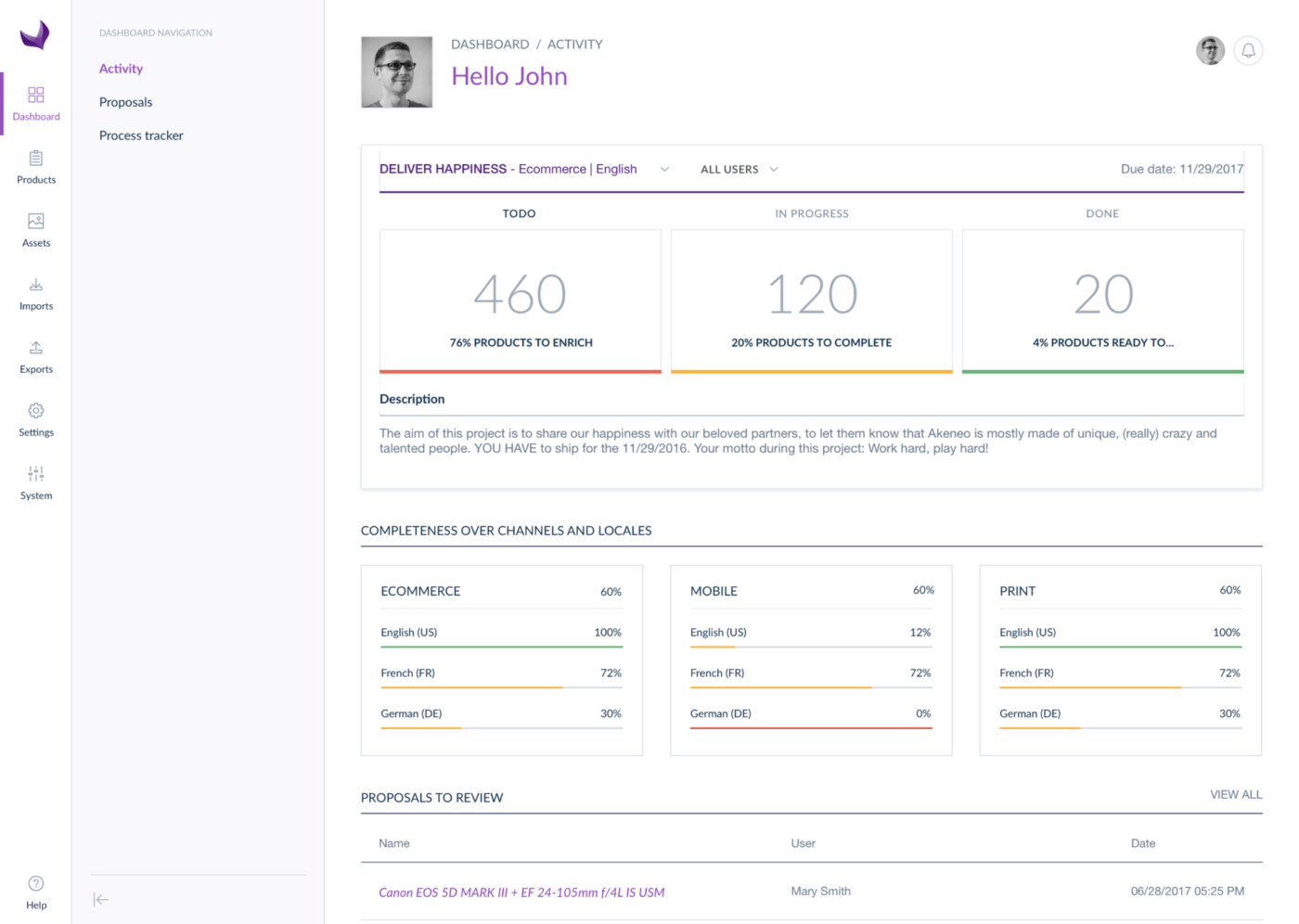
Akeneo offers a PIM platform for brands and retailers looking to manage and optimize their product information for omnichannel commerce.
It recently acquired Unifai, an AI-driven product categorization platform, and claimed the title of the “World’s First Intelligent Product Cloud.”
This acquisition aims to transform Akeneo from a sole PIM platform into a more comprehensive solution with embedded AI capabilities.
Akeneo best features
- Add missing details, translate product information into multiple languages, and ensure data quality for optimal product discoverability
- Facilitate collaboration between different teams involved in product management, such as marketing, sales, and content creation
- Generate product feeds and specifications tailored to different sales channels, including e-commerce platforms, marketplaces, and social media
- Provide features to define data quality rules, establish workflows for data approval, and track changes made to product information
- Take advantage of the open-source software for extensive customization and development of additional functionalities to cater to specific business needs
Akeneo limitations
- Has a steeper learning curve compared to simpler PIM solutions
- Transferring existing product data to Akeneo can be a complex process as it requires careful planning and extensive data transformation efforts
Akeneo pricing
- Community Edition: Free
- Growth Edition: $25,000/year
- Enterprise Edition: Custom pricing
Akeneo ratings and reviews
- G2: 4.5/5 (190+ reviews)
- Capterra: 4.8/5 (30+ reviews)
7. Syndigo

Syndigo is a leading cloud-based PIM platform that uniquely focuses on empowering brands to optimize their product content for syndication across various channels. While offering core PIM functionalities like data management, enrichment, and distribution, it helps you to increase efficiency, boost sales, and improve customer satisfaction too.
With Syndigo, you can streamline your content creation process, ensure data accuracy, and enhance the customer experience. It easily integrates with various trading partner networks, streamlining the syndication process and ensuring data consistency across all channels.
Its user-friendly interface and robust features make it easy to organize and update your product content in real-time.
Syndigo best features
- Optimize product content for specific channels, ensuring it meets your unique requirements and content formatting guidelines
- Leverage AI to analyze product information and identify areas for improvement
- Facilitate communication and streamline content management workflows
- Manage safety data sheets (SDS), allergens, and other compliance-related information centrally
Syndigo limitations
- Limited flexibility in catering to highly customized workflows or integrating with niche platforms
- Users have expressed concerns about potential vendor lock-in due to custom integrations and reliance on specific data migration and export formats
Syndigo pricing
- Custom pricing
Syndigo ratings and reviews
- G2: 4.4/5 (140+ reviews)
- Capterra: Not enough reviews
8. PIMworks

PIMworks differentiates itself by significantly emphasizing meeting the specific needs and budget constraints of small and medium-sized businesses.
SMBs looking for a user-friendly and cost-effective PIM solution will love PIMworks. Its pricing structure and features are designed to be accessible and relevant for businesses with smaller product catalogs and less complex data needs.
PIMworks includes features like automatic tagging, image recognition to extract attributes, and language translation capabilities.
PIMworks best features
- Get started quickly with an easy-to-use interface and simple setup process
- Leverage a wide range of pre-built integrations with popular e-commerce platforms and marketplaces
- Transition data smoothly with dedicated data migration assistance
- Use the white-label options for customized branding and personalization
PIMworks limitations
- Lack of features for handling intricate data structures, managing large-scale data migrations, or offering advanced security and compliance functionalities
- Users have noticed that analytics might be less robust compared to more established PIM solutions
PIMworks pricing
- Free
- Standard: $499/month
- Professional: $999/month
PIMworks ratings and reviews
- G2: 4.6/5 (60+ reviews)
- Capterra: Not enough reviews
9. inRiver
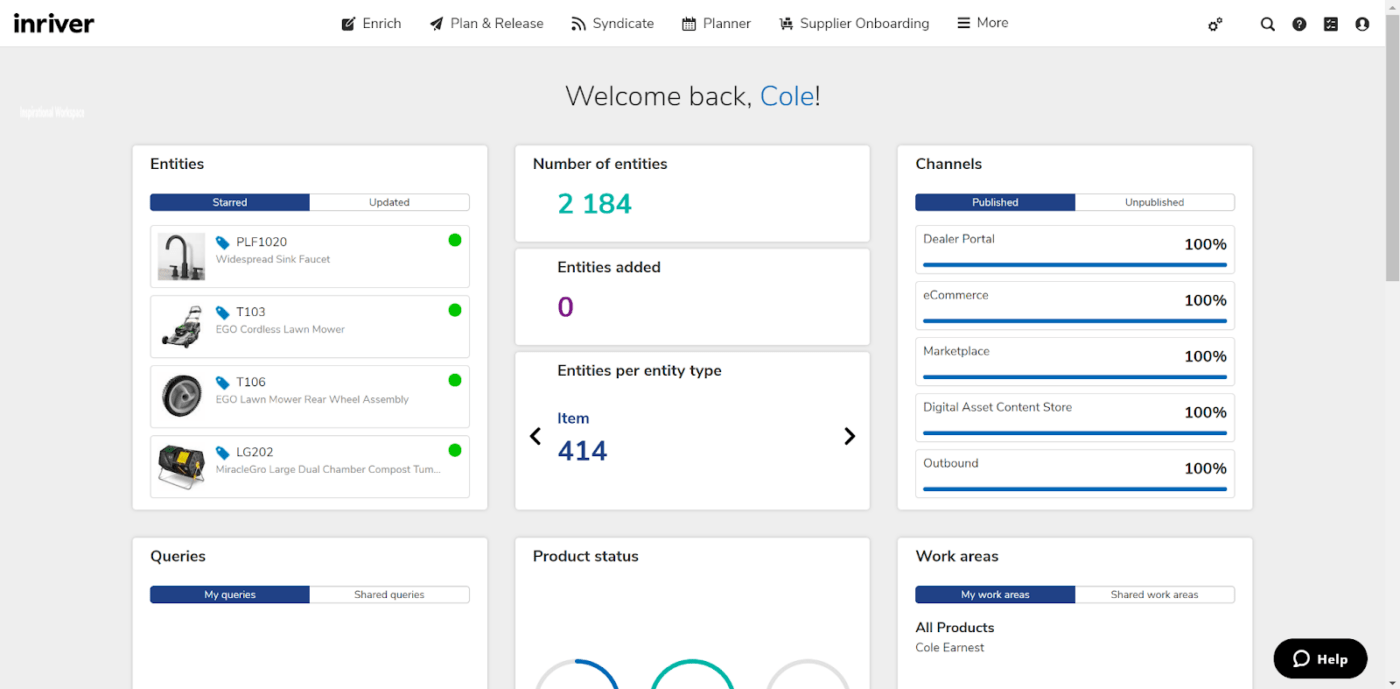
inRiver is a complete PIM solution that lets brands and retailers manage, optimize, and distribute product information across all touchpoints in the omnichannel landscape.
It boasts a unique composable architecture: This means the platform is built from modular components that can be easily added, removed, or customized to fit the specific needs of each business.
This allows for greater flexibility and adaptability compared to traditional PIM systems with fixed features.
inRiver best features
- API-based syndication integration for seamless content distribution
- Built-in digital shelf intelligence capabilities provide insights and analytics on how your products are performing on various online channels
- Automated content enrichment, data cleansing, and product categorization capabilities
- Cater to large enterprises with complex product life cycles, diverse sales channels, and intricate data needs
inRiver limitations
- Composable architecture and extensive functionality can lead to a steeper learning curve compared to simpler PIM platforms
- It may not be suitable for businesses with strict data residency requirements or those requiring on-premise deployment options
inRiver pricing
- Custom pricing
inRiver ratings and reviews
- G2: 4.1/5 (100+ reviews)
- Capterra: Not enough reviews
10. ClickUp
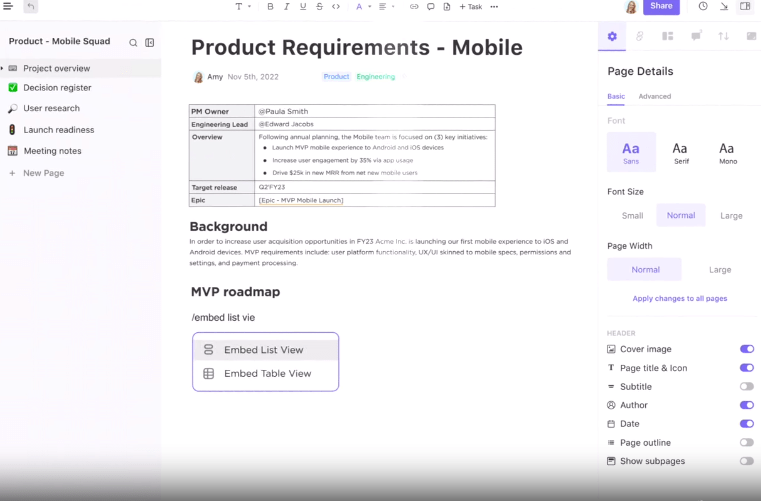
Not convinced one platform can do it all? Meet ClickUp’s Product Management Software—the only tool you’ll need to automate your workflows, accommodate various departments’ needs, and bring collaboration tools that make handling your sales and e-commerce channels a breeze.
Set clear timelines, measurable targets, and automatic progress tracking to ensure successful product launches with ClickUp Goals. ClickUp Goals allow you to define long-term product goals and break them down into smaller, actionable steps. This provides a clear visual roadmap for product development and helps track progress. Prioritize features and tasks within the roadmap. You can establish dependencies between tasks, ensuring a logical flow in the development process and improving product lifecycle management.

Brainstorm new product ideas with your team, sketch user flows and map user journeys, visualize the product’s entire lifecycle, and assign tasks to those who contributed their ideas with ClickUp Whiteboards. Multiple team members can contribute simultaneously on the whiteboard, fostering a collaborative ideation process.
You can also streamline communication with the built-in ClickUp Chat view to text your team by groups or directly, assign work, give feedback, ask for updates, share files in any format, and build seamless collaboration.

Create a central repository of product information by creating permission-controlled ClickUp Docs with rich media formatting and interactive features. Store product descriptions, specifications, manuals, and other relevant documents within designated Docs.
Use collaborative editing and version control to work on Docs simultaneously with your team and experience the convenience and efficiency of streamlined document management. You can easily export and import product information documents in any format and give access to specific people.
Finally, use 1,000+ ClickUp Templates for bug issue tracking and reporting, digital asset management, channel management, product development, and strategy, product planning agile boards, product progress sprints, and more.
ClickUp’s Product Requirements Doc Template is here to help you organize everything you’ll ever need to write about your new product.
In this template, you can add the product name and specs, define user personas and their use cases, write the product features, create a release schedule, add goals and success metrics, and create a design guideline to build the product.
It is crucial to consistently update the Product Requirements Document throughout the product development lifecycle as new information becomes available.
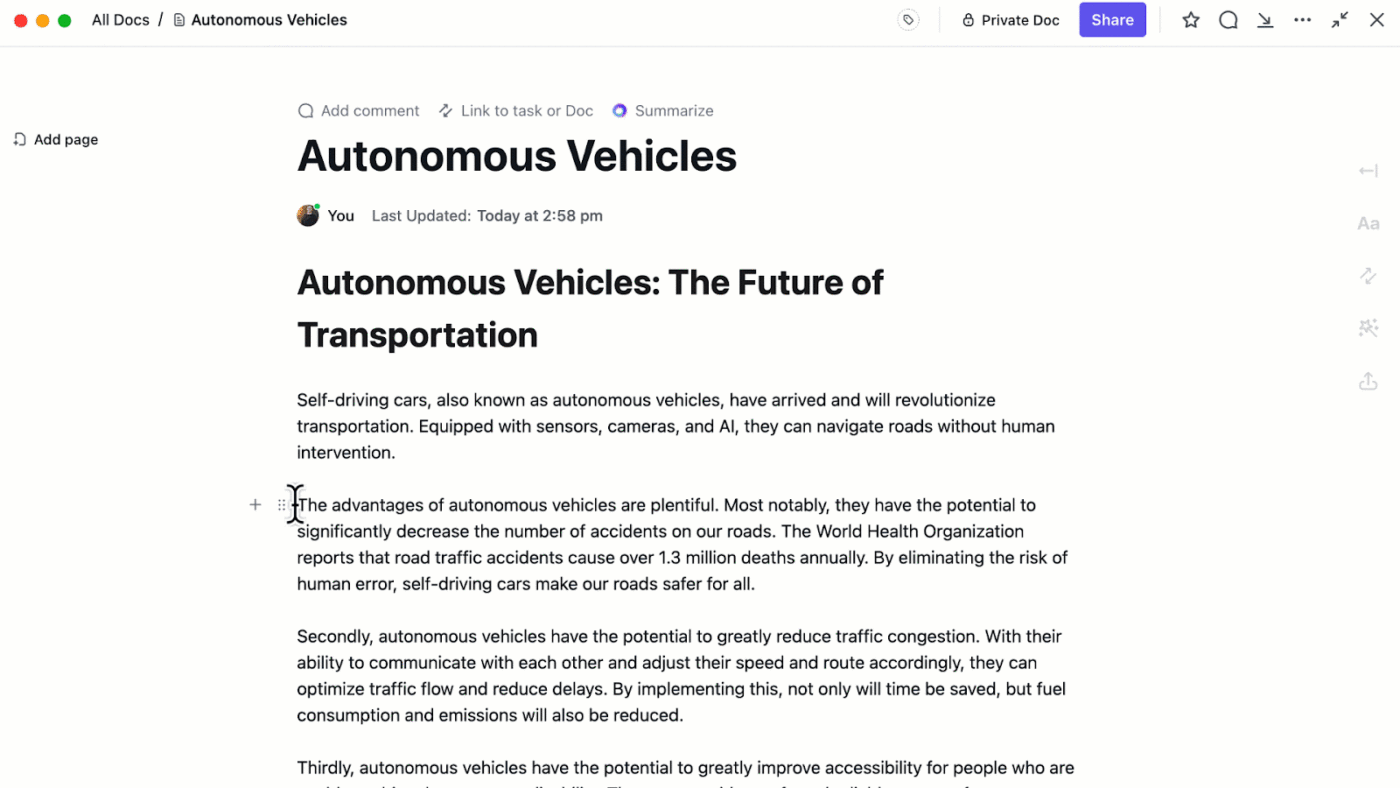
The best part? When you need a PIM amplifier, you can turn to ClickUp Brain, an AI assistant that helps you create PRDs, conduct market and competitor research, create PIM models, streamline user feedback, and more.
ClickUp Brain can summarize lengthy product descriptions, whiteboard discussions, or meeting notes, providing concise overviews of key information. This helps team members quickly grasp the essence of product details.
It can enable you to analyze product information across various ClickUp elements to identify trends or patterns. This can be valuable for understanding customer feedback, product usage data, or potential areas for improvement.
ClickUp best features
- Consolidate all your product information in one place using ClickUp Docs
- Facilitate seamless teamwork throughout the product lifecycle via ClickUp’s collaboration features
- Use extensive customization capabilities to tailor 15+ flexible views, ClickApps, and custom fields to your workflow, building products faster, and managing your selling-to-marketing pipeline
- Track project progress, sprints, team workloads, time spent on tasks, and project KPIs with customizable ClickUp Dashboards
- Automate work across your DevOps and CI/CD pipeline with 1,000+ ClickUp Integrations, including GitHub, Figma, Sentry, Slack, and more
ClickUp limitations
- New users may feel overwhelmed due to the extensive customization options
ClickUp pricing
- Free Forever
- Unlimited: $7/month per user
- Business: $12/month per user
- Enterprise: Contact for pricing
- ClickUp Brain is available on all paid plans for $5/user/Workspace per month
ClickUp ratings and reviews
- G2: 4.7/5 (9,300+ reviews)
- Capterra: 4.6/5 (4,000+ reviews)
Elevate the Way You Manage Product Information with ClickUp
With the 10 options that we have listed, we’re certain that choosing the perfect product information management software for your business will be easier. Consider the needs of your search products and departments and your budget.
The best PIM software empowers you to streamline product information management, publish accurate product data, and improve customer experiences across all channels.
However, if you’re looking for a comprehensive product management platform beyond PIM, consider ClickUp.
While it’s not strictly a dedicated PIM solution, ClickUp boasts powerful features like centralized data management, custom fields for product information, and seamless integration with various marketing and sales tools.
This allows you to manage your entire product lifecycle—from ideation and development to launch and marketing—within a single platform.
Ready to simplify product management?



Questions? Comments? Visit our Help Center for support.